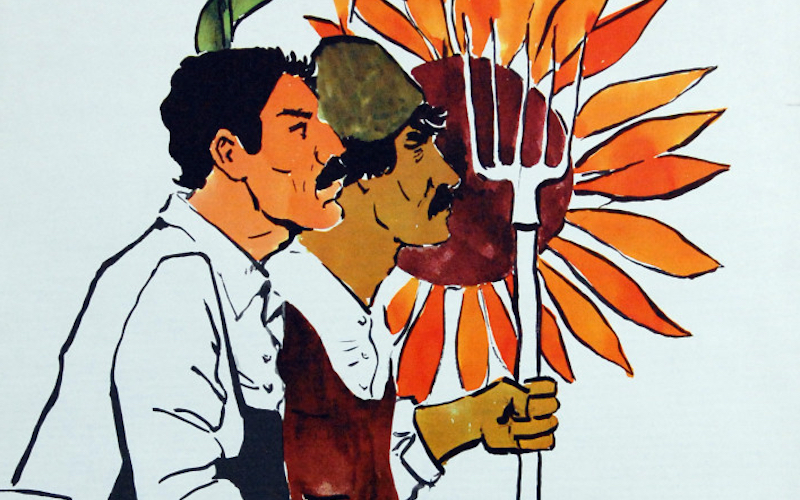
Lessons from the Tudeh Party for the Middle East
Mustafa Omar, a member of the Egyptian Revolutionary Socialists said that it is an illusion to imagine that a secular military dictatorship is better than the Islamists ruling Egypt. He wrote: “We do not believe that Islamic movements in different countries should be considered essentially the same. We always study Islamic movements in the historical context they are arising from.” In 2015 the Revolutionary Socialists demanded opening a dialogue with Islamists and wrote: “we should fight against everyday military repression alongside young Islamists.”
At the moment Gamal Heshmat from the Muslim Brotherhood supported the proposal to cooperate with revolutionary socialists against military rule. Revolutionary Socialists also expressed their view of the Brotherhood: “it is a reformist organization, an obstacle to the completion of the revolutionary process but never anti-revolutionary or capable of revolutionary mobilization.” Revolutionary Socialists also support Hezbollah and Hamas in Lebanon and Palestine as the forces of resistance against Zionism and imperialism, without any mention of the social restrictions these groups have imposed on people or their total disregard for democratic and human rights norms.
Such a point of view towards Islamists from a leftist organization in the Middle East is reminiscent of the tragic experience of the Tudeh Party in Iran more than three decades ago which was supported by Islamist leftists.
At first the Iranian Revolution of 1979 was in favor of the Tudeh Party. Noureddin Kianouri was the leader of the party at that time. The leading party’s defense of the rights of workers and women in the pre-revolution period was not popular and many considered it to be under Soviet influence. Kianouri supported the revolution leader -Ayatollah Khomeini.
The Tudeh Party intended to be the legal and loyal opposition within the Islamic Republic while trying to persuade the regime to have closer relations with the Soviet Union. Between 1979 and 1982, the party generally supported Hezbollah and the opponents of Iran-America relations against the Islamist liberals and demanded the strengthening of institutions under the control of school parties. For example, in 1981 the Tudeh Party asked the Islamic Republic to equip the Islamic revolutionary guards with heavy weapons to defend the revolution. The Tudeh Party also assisted the Islamic Republic through its members in the army, in preventing a coup by monarchists. The party was also supportive of the war effort of the newly established government against Iraqi. It also played the role of mediator in promoting national reconciliation in internal ethnic conflicts.
The Tudeh Party, besides influencing government institutions and organizations, also penetrated Islamist, liberal and monarchist political groups and parties. By passing on information about the other parties to the Islamic Republic, the Tudeh Party was trying to show its good will and believed that it would move them towards fulfilling the motto “unity of all anti-imperialist forces.” In this way, the Tudeh Party tried to get closer to the regime by giving information to the security agencies of the new government, as well as facilitating the elimination of left-wing opponents, especially Maoist and Marxist guerrilla groups including Fadayan-e khalq in order to be the only remaining left-wing party.
Tudeh Party called the other left parties agents of “imperialism” and “the CIA” and tried to isolate them. In fact, the “anti-imperialist” literature accussed opponents of being dependent on America. This Tudeh rhetoric was adopted by the Islamists and continues to this day in Iran’s media environment. Consequently, in conflicts between the Islamic Republic and the opposition, the Tudeh Party took sides with the Islamic Republic. The party called the opposition to the regime “Anti Revolutionary United Front” and took unprecedented steps in building cooperation with government officials to remove opponents. The scope of cooperation between the Tudeh Party and the Islamic Republic was even reflected in reports of the KGB branch at the Soviet Embassy. The Tudeh Party believed that by following the theory of a non–capitalist way of development, non-communist developing countries with revolutionary leadership in close cooperation with the Soviet Union could overrule or severely limit capitalism and eventually make a transition to Socialism.
But eventually all services given to Islamists by Tudeh Party not only did not result in a quid pro quo but also lead to the complete destruction of their organization. Four years after the revolution, the government attacks against the Tudeh Party and its members began. The government announced that the Tudeh Party had penetrated the army and attracted troops. In 1984, the Tudeh leaders one after the other confessed in front of public television cameras that they were spying for the Soviet Union, and were intending to overthrow the political system. After that a number of the Tudeh Party leaders changed their ideology. For instance, Ehsan Tabari, a party ideologue published books on Islam being superior to Marxism; he also condemned Gorbachev’s reforms in the Soviet Union. Imprisonment or execution of members of the party and the escape of others practically destroyed the party. The experience of the Tudeh Party demonstrates the irreparable consequences that cooperation of leftists with Islamists and lack of cooperation with liberals can be disastrous.

